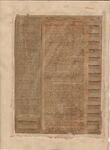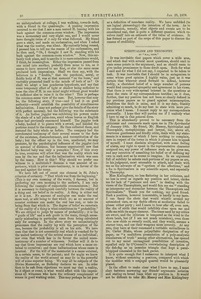HPB-SB-4-158: Difference between revisions
(Created page with "{{HPB-SB-header | volume = 4 | page =158 | image = SB-04-158.jpg | notes = | prev =157 | next =159 }} {{Style P-HPB SB. Title continued |Our Capital Letter|4-155-157}}...") |
mNo edit summary |
||
| (3 intermediate revisions by 2 users not shown) | |||
| Line 4: | Line 4: | ||
| image = SB-04-158.jpg | | image = SB-04-158.jpg | ||
| notes = | | notes = | ||
}} | }} | ||
{{Style P-HPB SB. Title continued |Our Capital Letter|4 | {{Style P-HPB SB. Title continued |Our Capital Letter|4-157}} | ||
... | |||
{{HPB-SB-item | {{HPB-SB-item | ||
| Line 15: | Line 16: | ||
| item =1 | | item =1 | ||
| type = article | | type = article | ||
| status = | | status = proofread | ||
| continues = | | continues = 159, 160 | ||
| author = | | author = Moses, W. S. | ||
| author signed = M. A. (Oxon) | |||
| title =Spiritualism and Theosophy | | title =Spiritualism and Theosophy | ||
| subtitle = | | subtitle = | ||
| untitled = | | untitled = | ||
| source title =Spiritualist | | source title = London Spiritualist | ||
| source details = | | source details = No. 283, January 25, 1878, pp. 38-40 | ||
| publication date =1878-01-25 | | publication date = 1878-01-25 | ||
| original date = | | original date = | ||
| notes = | | notes = | ||
| Line 29: | Line 31: | ||
}} | }} | ||
... | {{Style S-Small capitals|It}} was inevitable that papers which cover a wide area, and which deal with several moot questions, should omit to state some points in the argument, and so should seem to give undue prominance to those dwelt upon. Both for what I said and for what I did not say, I expected to be taken to task. It was inevitable that I should be in antagonism to some whose good opinion I highly value, just as it was certain that whoever stood forward to defend, however feebly, a cherished belief of a large number of persons would find unexpected sympathy and agreement in his views. That there is very wide-spread interest in the questions at issue the state of my correspondence testifies; as it does, further, that my position has not been so clearly defined in my previous papers as to guard against misconception. Doubtless the fault is mine, and it is my duty, frankly admitting so much, to do my best to state with more precision what I mean. I cannot reply to my correspondents personally. I hope they will pardon me if I embody what I have to say in this general form. | ||
This is abundantly proved to be necessary from the criticisms and comments made upon me in ''The Spiritualist'' of January 18th. My friend, Mr. Massey, Spiritualist and Theosophist, metaphysician and lawyer, but, above all, courteous gentleman and kindly critic, deals with my statements in a manner of which I have nothing to complain, save in respect of the terms in which it pleases him to speak of myself. I must disclaim altogether, with some feeling of alarm, any right to speak in the representative character assigned me, any power of influence such as he gives me, and any intention of assaulting his belief or of defining my own in such sort as he seems to imagine. In an argument full of subtlety he selects such portions of my papers as are, in his judgment, most amenable to attack, and deals with me as the advocate of an “egotism of the affections,” and a foe to Spiritualism in any scientific aspect, and especially to Theosophy. | |||
Miss Kislingbury, no less flattering in her criticism, and no less in error as regards my position and intent, chides me for lack of “patience and care” in dealing with the views of the Theosophists, and would fain see me “standing as interpreter and reconciler between the Theosophists and Spiritualists.” Thank you for nothing, my good friend. Such a position, however honourable, is hardly to my taste. I can fancy the shots that would whistle around my astonished ears, as my feeble efforts at mediation failed to please either party; and I seem to hear afar off, even now, the din of strife that would infallibly close upon me and stifle me with its angry clamour. The tones used by my critics are sweet, and the criticism is tempered as the wind to the shorn lamb, but (if I am not much mistaken), even those who now chide so sweetly could, and they would, assume a sterner tone, and use their weapons more severely. At any rate, they have at their command a veritable mitrailleuse in Dr. Carter Blake, whose polysyllabic designation of my paper, as “a multiform presentation of a poly-analystic simulacrum of truth” among other alternatives, has opened out to my mind unimagined possibilities of invective, equalled only by O’Connell’s overwhelming description of the fish-fag as an isosceles triangle that kept a parallelepiped concealed in the back garret. | |||
It is quite enough that I endeavour to interpret what I know, without assuming a position, compared with which the meddler with a conjugal quarrel would be pleasantly placed. | |||
In the effort to make clear what I have to say, I must elect between answering my friends’ arguments seriatim and stating on broad lines what my position is. It would not be difficult to take Mr. Massey and Miss Kislingbury {{Style S-HPB SB. Continues on |4-159}} | |||
{{HPB-SB-footer-footnotes}} | |||
{{ | {{HPB-SB-footer-sources}} | ||
<gallery widths=300px heights=300px> | |||
london_spiritualist_n.283_1878-01-25.pdf|page=4|London Spiritualist, No. 283, January 25, 1878, pp. 38-40 | |||
</gallery> | |||
Latest revision as of 09:49, 7 October 2024
< Our Capital Letter (continued from page 4-157) >
...
Spiritualism and Theosophy
It was inevitable that papers which cover a wide area, and which deal with several moot questions, should omit to state some points in the argument, and so should seem to give undue prominance to those dwelt upon. Both for what I said and for what I did not say, I expected to be taken to task. It was inevitable that I should be in antagonism to some whose good opinion I highly value, just as it was certain that whoever stood forward to defend, however feebly, a cherished belief of a large number of persons would find unexpected sympathy and agreement in his views. That there is very wide-spread interest in the questions at issue the state of my correspondence testifies; as it does, further, that my position has not been so clearly defined in my previous papers as to guard against misconception. Doubtless the fault is mine, and it is my duty, frankly admitting so much, to do my best to state with more precision what I mean. I cannot reply to my correspondents personally. I hope they will pardon me if I embody what I have to say in this general form.
This is abundantly proved to be necessary from the criticisms and comments made upon me in The Spiritualist of January 18th. My friend, Mr. Massey, Spiritualist and Theosophist, metaphysician and lawyer, but, above all, courteous gentleman and kindly critic, deals with my statements in a manner of which I have nothing to complain, save in respect of the terms in which it pleases him to speak of myself. I must disclaim altogether, with some feeling of alarm, any right to speak in the representative character assigned me, any power of influence such as he gives me, and any intention of assaulting his belief or of defining my own in such sort as he seems to imagine. In an argument full of subtlety he selects such portions of my papers as are, in his judgment, most amenable to attack, and deals with me as the advocate of an “egotism of the affections,” and a foe to Spiritualism in any scientific aspect, and especially to Theosophy.
Miss Kislingbury, no less flattering in her criticism, and no less in error as regards my position and intent, chides me for lack of “patience and care” in dealing with the views of the Theosophists, and would fain see me “standing as interpreter and reconciler between the Theosophists and Spiritualists.” Thank you for nothing, my good friend. Such a position, however honourable, is hardly to my taste. I can fancy the shots that would whistle around my astonished ears, as my feeble efforts at mediation failed to please either party; and I seem to hear afar off, even now, the din of strife that would infallibly close upon me and stifle me with its angry clamour. The tones used by my critics are sweet, and the criticism is tempered as the wind to the shorn lamb, but (if I am not much mistaken), even those who now chide so sweetly could, and they would, assume a sterner tone, and use their weapons more severely. At any rate, they have at their command a veritable mitrailleuse in Dr. Carter Blake, whose polysyllabic designation of my paper, as “a multiform presentation of a poly-analystic simulacrum of truth” among other alternatives, has opened out to my mind unimagined possibilities of invective, equalled only by O’Connell’s overwhelming description of the fish-fag as an isosceles triangle that kept a parallelepiped concealed in the back garret.
It is quite enough that I endeavour to interpret what I know, without assuming a position, compared with which the meddler with a conjugal quarrel would be pleasantly placed.
In the effort to make clear what I have to say, I must elect between answering my friends’ arguments seriatim and stating on broad lines what my position is. It would not be difficult to take Mr. Massey and Miss Kislingbury <... continues on page 4-159 >
Editor's notes
- ↑ Spiritualism and Theosophy by Moses, W. S. (signed as M. A. (Oxon)), London Spiritualist, No. 283, January 25, 1878, pp. 38-40
Sources
-
London Spiritualist, No. 283, January 25, 1878, pp. 38-40


